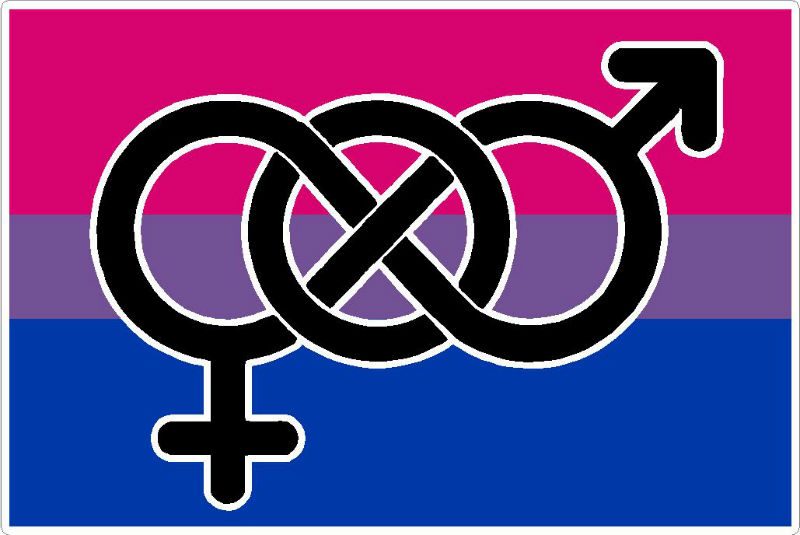Bisexual Health Awareness Month kicks off with a look at Mental Health & Biphobia.
Everyone accepts that it’s possible for a person to be attracted to people of more than one height, weight, hair color, or race. For bisexuals that openness also includes gender. We think bisexuals are just as decisive, confused, honest, red-haired, tall or fat as everyone else. They still face prejudices and discrimination and they can also be normal and boring. Bisexuality is not ‘just a phase’ or ‘an easy option.’
The bisexual community remains marginalized and underserved and Bisexual Resource Center (BRC) designates March as Bisexual Health Awareness Month (BHAM) in recognition of this fact.
This is the second year of this social media campaign and it is dedicated to raising awareness about the bi community’s mental health disparities.
Bisexuals have been called selfish, unfaithful, confused, and much more when in fact they have a wide range of desire or attraction. Some people seem to confuse being attracted to more than one gender with being attracted to everyone. It’s not the bisexuality that makes them this way. People are just different, varied, and diverse. Being attracted to more than one gender makes them different – we make society more diverse. Diversity should be celebrated.
This kind of labeling has caused a big percentage of the bisexual community to suffer consistently from higher levels of depression, suicide, substance use, anxiety, and other mood disorders and this year BHAM will raise awareness about these mental health disparities and will push for support for bisexual individuals.
This year BHAM will incorporate three main values – Intersection, Support, and Advocacy – into its campaign to highlight the diverse challenges that the bisexual community faces, promote bisexual-specific resources, and propose interventions to decrease mental health disparities.
Please visit the BRC campaign website for more information.
BRC Board President, Julia Canfield, stressed on the need for this campaign stating: “Bisexual people have long been impacted by the negative effects of biphobia and bisexual erasure from both LGBTQ and straight communities. They have also been denied access to critical services and resources that can enhance their mental and emotional well-being. Therefore, Bisexual Health Awareness Month aims to increase awareness about these issues and feature ways we can effectively address them.”
Ellyn Ruthstrom, president of the Bisexual Resource Center, said the report found that bisexuals are more likely to stay closeted, which adversely affects their mental well-being.
She added: “The fear of being stereotyped manifests in a real way: bisexual people are six times more likely than gay men and lesbians to be closeted. This impacts the emotional well-being of many bisexual people and is a contributing factor to the community’s higher rates of poor physical and mental health.”
Bisexual Health Awareness Month will have the following focus themes throughout the four weeks of March in order to emphasize the various issues regarding mental health in the bisexual community:
- March 2-6: (Statistics) A focus on current statistics and research data concerning mental health disparities in the bisexual community.
- March 9-13: (Intersectionality) An emphasis on how race, ethnicity, class, age, ability, etc., can further impact mental health disparities in the bisexual community, particularly in regards to experiences of oppression and discrimination.
- March 16-20: (Resources) A spotlight on current resources and creation of new ones that can address mental health disparities in the bisexual community.
- March 23-27: (Action) The promotion and development of interventions, policies, and other activities that work to prevent or decrease mental health disparities in the bisexual community.
Bisexual Health Awareness Month launched on Monday, March 2nd on the BRC’s Twitter (with hashtag #bihealthmonth), Facebook, and Tumblr pages. The BRC invites individuals and organizations both in the United States and from around the world to become involved with the campaign and to raise awareness about bisexual mental health disparities in their own communities.
As a society, we are angered by those who refuse to accept our existence, issues, contributions, alliances, and our voice. It is time for the bisexual voice to be heard.
Don’t assume that there are only two genders. Do not mistake fluidity for confusion, irresponsibility, or an inability to commit. Do not equate promiscuity, infidelity, or unsafe sexual behavior with bisexuality. Those are human traits that cross all sexual orientations. Nothing should be assumed about anyone’s sexuality.
By nature, to be involved simultaneously with both genders is necessary for our fulfillment as human beings. Bisexuals are tired of being analyzed, defined and represented by people other than themselves, or worse yet, not considered at all. Many are frustrated by the imposed isolation and invisibility that comes from being told or expected to choose an identity.
More information: bihealthmonth.wordpress.com
